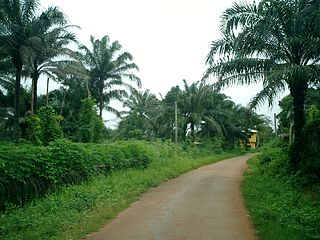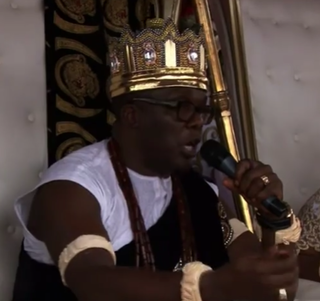Related Research Articles

Anambra State is a Nigerian state located in the South-eastern region of the country. The state was created on 27 August 1991. Anambra state is bounded by Delta State to the west, Imo State and Rivers State to the south, Enugu State to the east and Kogi State to the north. The state's capital is Awka, while the state’s largest city is Onitsha which is regarded as one of the largest metropolis in Africa. Nnewi is the second largest commercial and industrial city in Anambra State, and also a known automobile hub within Nigeria and Africa.

Nnewi is a commercial and industrial city in Anambra State, southeastern Nigeria. It is the second largest city in Anambra state after Onitsha. Nnewi as a metropolitan area has two local government area, which are Nnewi North and Nnewi South, all centred around the Nnewi town. Even Ekwusigo local government area is now part of Nnewi urban area, as urbanization continues to spread from Nnewi to neighbouring communities. The Nnewi town which is the only town in Nnewi North, comprises four villages: Otolo, Uruagu, Umudim, and Nnewichi. Nnewi had been the centre of economics and commerce, being at a time the fastest growing industrial city east of the Niger, being the home of many industries such as The Ibeto Group, the Chicason Group, Cutix Cables, amongst others. The first indigenous car manufacturing plant in Nigeria is located in the city while the first wholly Made-in-Nigeria motorcycle, the 'NASENI M1' was manufactured in Nnewi.

Prince AkwekeAbyssinia Nwafor Orizu (GCON)(; 17 July 1914 – 1999) was a Nigerian Politician, who served as President of the Nigerian Senate from 1963 to early 1966, during the Nigerian First Republic. Orizu was also Acting President of Nigeria from late 1965 until the military coup of January 1966. He was a member of the Nnewi Royal family. His nephew Igwe Kenneth Onyeneke Orizu III is the current Igwe (King) of Nnewi Kingdom. Nwafor Orizu College of Education in Nsugbe, Anambra State, is named after him.
Nnewi North is a Local Government Area in Anambra State, south-central Nigeria. Nnewi is the only town in Nnewi North LGA. It has four villages (sub-towns) that make up the one-town local government, which includes; Otolo, Uruagu, Umudim and Nnewi-ichi. The traditional ruler of Nnewi- Igwe of Nnewi -presently is Igwe Kenneth Orizu the 3rd of which this royal family is from Otolo Nnewi, and for this reason, is regarded as first among equals of the four villages. Other traditional rulers exist in other villages and they oversee the traditional affairs of their respective villages, amongst which are Obi Nnamdi AC Obi (ogidi) who is obi of Uruagu, Obi Umudim And obi Onyekaba Of Nnewichi. In this vein one may ask who is now Obi of Otolo since the royal family of Igwe oversees the traditional affairs of entire nnewi.
Nsugbe is a town in Anambra East Local Government Area, Anambra State, Nigeria.
Igwe Kenneth Onyeneke Orizu III is the 20th Obi of Otolo and Igwe of Nnewi kingdom. He is the traditional supreme ruler and spiritual leader in Nnewi, an Igbo city in Nigeria. He is a member of the Nnofo Royal lineage and the successor to his father Igwe Josiah Orizu II, his grandfather Igwe Orizu I, and great-grandfather Igwe Iwuchukwu Ezeifekaibeya. Unlike most Igbo chiefs, there were heads of Nnewi before the arrival of Europeans. In Anambra State, Igwe Kenneth Orizu III is the vice chairman of the Anambra State House of Chiefs and as of 2015 one of the longest-serving tribal Kings in the world.

Orlu Ishiobiukwu Gedegwum is the ancient palace and nerve centre of the Orlu people. This is the residence of the traditional monarchy of Orlu, known as the Igwe of Orlu in Nigeria. Located in Imo state, the palace is often at the centre of state occasions and royal hospitality. It has always been a focal point for traditional festivals, ceremonies and dispute resolution.
Igwe Iwuchukwu Ezeifekaibeya (1855-1904) was the 17th Obi of Otolo and Igwe of Nnewi kingdom in the present day Anambra state of Nigeria. He is the traditional supreme ruler and spiritual leader in Nnewi, an Igbo city in Nigeria. He is a member of the Nnofo Royal lineage and the successor to his father Igwe Okafo. Unlike most Igbo monarchies, there were kings of Nnewi before the arrival of Europeans.
Igwe Orizu I was the 18th Obi of Otolo and the Igwe of Nnewi kingdom. He was the traditional supreme ruler and spiritual leader in Nnewi, an Igbo city in Eastern Nigeria. Eze Ugbonyamba was crowned the King of Nnewi and he took the ofo of Nnewi after his father's death in 1904. He was a member of the Nnofo Royal lineage and the successor to his father Igwe Iwuchukwu Ezeifekaibeya. Igwe Orizu I died in 1924 and was succeeded by his first son Igwe Josiah Orizu II. One of remarkable events of his reign was the arrival of the British in 1905.
Igwe Josiah Nnaji Orizu II (1902–1962) was the 19th Obi of Otolo and Igwe of Nnewi kingdom. He took the ofo of Nnewi in 1924 after his father's death. He is a member of the Nnofo Royal lineage and the successor to his father Igwe Orizu I , He was the first Igwe to officially become a Christian, although the traditional rulers of Nnewi are the ofo holders and as such, preservers and upholders of Nnewi culture and traditions.

Awka-Etiti, historically known as Awka-Diedo ; later mentioned as Awka-Nkakwu (Okankaku) by colonial authors, is an affluent town comprising seven villages in Idemili South local government area of Anambra state, Nigeria. The seven villages of Awka-Etiti in order of age established are: Nkolofia, Umunocha, Ejighinandu, Iruowelle, Umudunu, Nnaba and Ogunzele.
Igwe, is a royal title or method of addressing traditional rulers that control autonomous communities in Igboland. In other words, Igbos approximate the term to the HM style. An Igwe is therefore defined as a holder of a title of respect and honor in Igboland. Such a person is otherwise known as an Eze. The foremost and one of the most respected Igwe's in Igboland is Igwe of Nnewi, Igwe Kenneth Onyeneke Orizu III.
The Nnewi monarchy is a traditional inheritance of the throne based on patrilineality and sonship heredity. In Nnewi the traditional monarch is called the Igwe. The Igwe is born and not made or elected, and the institution of inheritance is the traditional right and primogeniture privilege. The position is neither transferable nor negotiable.
Igwe Okafo was the 16th Obi of Otolo and Igwe of Nnewi kingdom. He was the traditional supreme ruler and spiritual leader in Nnewi, an Igbo city in Nigeria. He is a member of the Nnofo Royal lineage and the successor to his father Eze Ukwu. Unlike most Igbo monarchies, there were kings of Nnewi before the arrival of Europeans.
Eze Ukwu (1799–1862) was the 15th Obi of Otolo and Igwe of Nnewi kingdom. He was the traditional supreme ruler and spiritual leader in Nnewi, an Igbo city in Nigeria. He was a member of the Nnofo Royal lineage and the successor to his father Eze Chukwu. Unlike most Igbo monarchies, there were kings of Nnewi before the arrival of Europeans.
Afiaolu is a traditional festival held annually in Nnewi, Anambra State, Nigeria around August. The Afiaolu festival commences on “Eke” day with what is traditionally described as “Iwaji” and Ikpa Nku, this heralds the availability of new yam as well as thanksgiving to God. The festival includes a variety of entertainments including performance of ceremonial rites by the Igwe (king), cultural dance by girls and masquerade dance.
Nike Community, in Enugu East, Enugu State Nigeria. It has borders with Nsukka, Ebonyi and Enugu North and is one of the state's largest zones, featuring several tourist sites and commercial areas, including Nikelake Hotels. The community is under the monarchical leadership of HRM, IGWE. NNAJI. The region comprises 24 villages. They are subject to the authority of Enugu East of Enugu state, Nigeria.

Gerald Mbamalu. is the traditional ruler of Ojoto in Idemili-South Local Government Area of Anambra State, in Nigeria.
References
- 1 2 3 Onwutalobi, Anthony-Claret; Alutu, Dr. John. "Nnofo Royal Lineage". Nnewi City Portal. Archived from the original on 19 June 2021. Retrieved 17 September 2015.
- 1 2 3 Alutu, Dr. John Okonkwo (1986). Nnewi History (from the Earliest times to 1980/82). Nigeria: Fourth Dimension Publishing Company. ISBN 978-156-224-2.
- 1 2 Admin, Nnewi. "List of Nnewi Monarchs - The Official Nnewi City Portal". www.nnewi.info. Retrieved 2015-09-17.[ permanent dead link ]
- 1 2 Onwutalobi, Anthony-Claret. "Nnewi Monarchy - The Official Nnewi City Portal". www.nnewi.info. Archived from the original on 2021-06-23. Retrieved 2015-09-17.
- 1 2 Ugochukwu, C.N. (2000). Isu Factor in Nnewi History. Nigeria: Tabansi Publishers. ISBN 9789782997937.